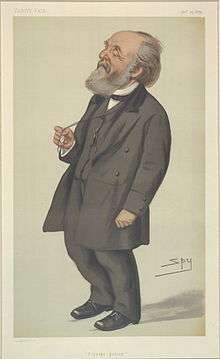Peter Rylands
Peter Rylands (18 January 1820 – 8 February 1887) was an English wire-manufacturer in Lancashire and a Liberal politician who was active in local government and sat in the House of Commons in two periods between 1868 and 1887.

Life
Rylands was born at Warrington, the son of John Rylands and his wife Martha Glazebrook, daughter of the Rev. James Glazebrook, vicar of Belton. He was educated at Boteler's Grammar School, Warrington.[1] He was a wire manufacturer and active in local government. As early as 1843 he was corresponding with Richard Cobden on political matters.[2] He was Mayor of Warrington from 1853 to 1854.[3] He had directorships of the Manchester and Liverpool Banking Co., of the Bridgewater Navigation Co., of Pearson and Knowles Coal and Iron Co., Limited, and of Rylands Brothers, Limited, iron masters and wire manufacturers. He was a J.P. for Cheshire and Lancashire.[1]
At the 1868 general election Rylands was elected Member of Parliament (MP) for Warrington. He was a member of the Royal Commission on Contagious Diseases in 1872.[1] He lost his Warrington seat at the 1874 general election,[4] when he also stood unsuccessfully in the South-Eastern Division of Lancashire.[5] In 1876 he won a parliamentary by-election in Burnley,[6] where he was re-elected in 1880 and 1885. When the Liberals split over the First Home Rule Bill, Rylands joined the breakaway Liberal Unionists, and was returned to the House of Commons at the 1886 general election as a Liberal Unionist.[7] He held the seat until his death on 8 February 1887 at the age of 67.[8]
Rylands lived at Massey Hall, Thelwall which he left to the local authority for educational purposes.
Rylands married twice. He had three sons by his second wife Caroline Reynolds, whom he married in 1861.[8] His eldest son, the author L. Gordon Rylands, published an edition of his letters.[9] A grandson was the academic Dadie Rylands.[10]
References
- Debrett's House of Commons and the Judicial Bench 1886
- Howe, Anthony (ed) The Letters of Richard Cobden; Vol. 1: 1815–1847. Oxford: Oxford University Press (1 Jun 1843)
- Warrington – Warrington Borough Council – Past Mayors Archived 11 November 2007 at the Wayback Machine
- Craig, F. W. S. (1989) [1977], British Parliamentary Election Results 1832–1885 (2nd ed.), Parliamentary Research Services, p. 319, ISBN 0-900178-26-4
- Craig 1832–1885; p. 413
- Craig 1832–1885; p. 71
- Craig, F. W. S. (1989) [1974], British Parliamentary Election Results 1885–1918 (2nd ed.), Parliamentary Research Services, p. 88, ISBN 0-900178-27-2
- Matthew, Lee. "Rylands, Peter (1820–1887)". Oxford Dictionary of National Biography (online ed.). Oxford University Press. doi:10.1093/ref:odnb/24417. (Subscription or UK public library membership required.)
- "The Man of Philanthropy, Politics and Clogs". Warrington Museum & Art Gallery.
- http://genealogy.ukga.org/cgi-bin/genealogy.cgi?action=View&doc=register&recid=17698
External links
- Dictionary of National Biography, 1885-1900, Volume 50, Rylands, Peter
- Works by or about Peter Rylands at Internet Archive
- Hansard 1803–2005: contributions in Parliament by Peter Rylands
| Parliament of the United Kingdom | ||
|---|---|---|
| Preceded by Gilbert Greenall |
Member of Parliament for Warrington 1868 – 1874 |
Succeeded by Gilbert Greenall |
| Preceded by Richard Shaw |
Member of Parliament for Burnley 1876 – 1887 |
Succeeded by John Slagg |